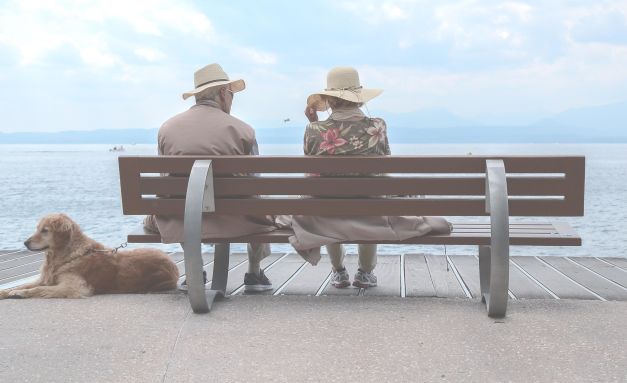
We have a family friend who is just a delightful woman. At 70+ years, she's a bit of a hermit and so when she rescued a dog to be part of her life, we were thrilled. Though Tiko was already older, he had a great personality and would get her outdoors for walks and socializing. When Tiko passed away, we were concerned. She no longer had a purpose in life, and she had lost her excuse to leave the house. We knew it would be necessary for us to support her during this time because of all of the unique challenges she would be facing as a senior without much contact with the world outside her home's walls.
It’s never easy to lose a pet, regardless of the circumstances. Nonetheless, people living in their golden years are particularly susceptible to the grief over a deceased animal companion. Loss is one of the most prevalent experiences seniors have, as their parents, spouses, siblings, and friends age and pass away. This loss may even be in addition to common effects of aging, such as reduced mobility and strength.
What's more, many seniors are physically and emotionally isolated, with only the presence of their pets to comfort them. It therefore makes sense that seniors tend to develop strong bonds with their four-legged friends. These connections meet a long list of emotional and physical needs.
To further compound their challenges, as retirees, they no longer have their careers to keep them motivated and focused. While their identity used to be tied up in the work they did, without employment they may feel they can only be useful in caring for a pet. Losing their animal friend represents not only the loss of a companion, but the loss of purpose and meaning in life.
Wondering how best to support someone in your life in this situation during their golden years? We've got some ideas to help you provide the thoughtful, purposeful, and practical support these individuals may want and need as they say goodbye to yet another friend.
How to Help a Senior Through Pet Loss Grief
An elderly individual facing pet loss needs lots of empathy and support, whether it comes from a family member, friend, neighbour, or other community member. This need may start to develop when the senior faces the pet’s declining health and must make decisions regarding end of life choices for their animal companion. From this time forward, the pain may become overwhelming as the loved one he or she once relied on for friendship and purpose is becomes less and less available.
If you know someone struggling with such grief, or may soon be in a position to do so – and if you are able and open to offering support – here are the best steps you can take to do so:
- Avoid Judgment: An senior must consider a variety of concerns when caring for a sick or dying animal. He or she might not have the resources to pay for extensive veterinary care, for instance. Avoid passing judgment on any of the individual’s worries. All points are valid. Questioning their opinions or choices will likely cause more turmoil – not to mention a hesitancy to further discuss them. Stay positive and affirmative when suporting him or her. Allow their priorities to be your guide.
- Ask and Listen: Your friend of advanced years may not feel comfortable openly expressing emotion. Instead of waiting for the individual to ask for help, it’s up to you to offer your support and assistance. Once you ask, listen closely to what he or she needs and wants. Talking and time are most valuable, so be patient.
- Offer Information: If you learn that the senior is relying on outdated medical information, encourage the individual to openly discuss the issues with a veterinarian. Offer to attend the appointment with him or her, to help ask questions and record the facts. Remember that the senior may have trouble hearing or require more time that you need to process information. You can also help the older person make a plan for the care of the animal should something happen to him or her.
Through regular visits and phone calls, and by helping the senior participate in community activities, you can help him or her find joy in life again. Maybe, when the time is right, you can even help the individual welcoming another pet into his or her life. Most importantly, your guidance and compassion will greatly ease the burden of grief and journey to recovery.
Practical Support for Seniors Experiencing Pet Loss
There are so many things you can do to support anyone going through pet loss, but the practical ways to provide emotional and physical help for a senior are nearly numerous. This list should give you plenty of ideas of how best to be the kind of friend the senior in your life needs.
- Help arrange a memorial service or funeral for your friend's pet.
- Do research on pet crematoriums and cemeteries in your area to provide end-of-life options.
- Offer to stay with an immobile or infirm pet so that your senior friend can run errands or attend social events that will keep him or her plugged into a support system.
- Connect the person with a hotline for pet loss support, an experienced pet grief therapist, or online grief therapy group.
- Try to find a local nonprofit that provides financial support for those who cannot afford veterinary care. One option in our area is the BirchBark Foundation. This may give your elderly friend some additional options in seeing their pet through the end of life stage.
- Offer to be present during the final hours of the pet's life and/or for the memorial service.
- Give the gift of a transition object your friend can carry with them in the immediate aftermath of the pet's death to offer a sense of closenes to the deceased.
- Help him or her take a pet portrait (with both animal and human!).
- If you are concerned that your elderly friend will pass away before his or her animal companion, help arrange for the animal's care in such an event. Practical ways to aid in this process: 1) Ensure there is a provision in their estate plan for the care of the animal friend; 2) Have him or her carry a wallet-card that outlines special instructions for pet care; and 3) Designate a new pet home in the event of the senior's death. These kinds of arrangements can go a long way to providing peace of mind to your friend.
- Share memories, photos, and videos of the animal companion and consider helping him or her put together a pet memorial video presentation or photo album as a keepsake.
- Assist in sorting through the pet's possessions after an appropriate grieving period. Be sure not to rush your friend to get it done.
- Make a donation in the pet's name to an animal-related charity.
- Remember to touch base with him or her at important milestones after the loss of the pet with a phonecall or a sympathy card - one month prior, on the pet's birthday, at holiday time, and so on.
Thank you for being the one to aid in your elder friend's pet loss. One of the best things you can do to anticipate what he or she may need, read up on how pet grief works, and be willing to take on any little task needed through the process. A kind heart and listening ear are always appreciated by thouse mourning a loss. May these ideas give you the guidance you need to do it to the best of your abilities.
Images: Nathalia Bariani, Huy Phan, Ian Schneider
Affiliate Disclosure: There may be affiliate links on this page which help to pay for Tiny Pet Memories. If you make a purchase through a link I provide, thank you because it may allow me to earn a small commission at no additional cost to you. I am not paid to promote specific products. Any opinions I express are strictly my own.


